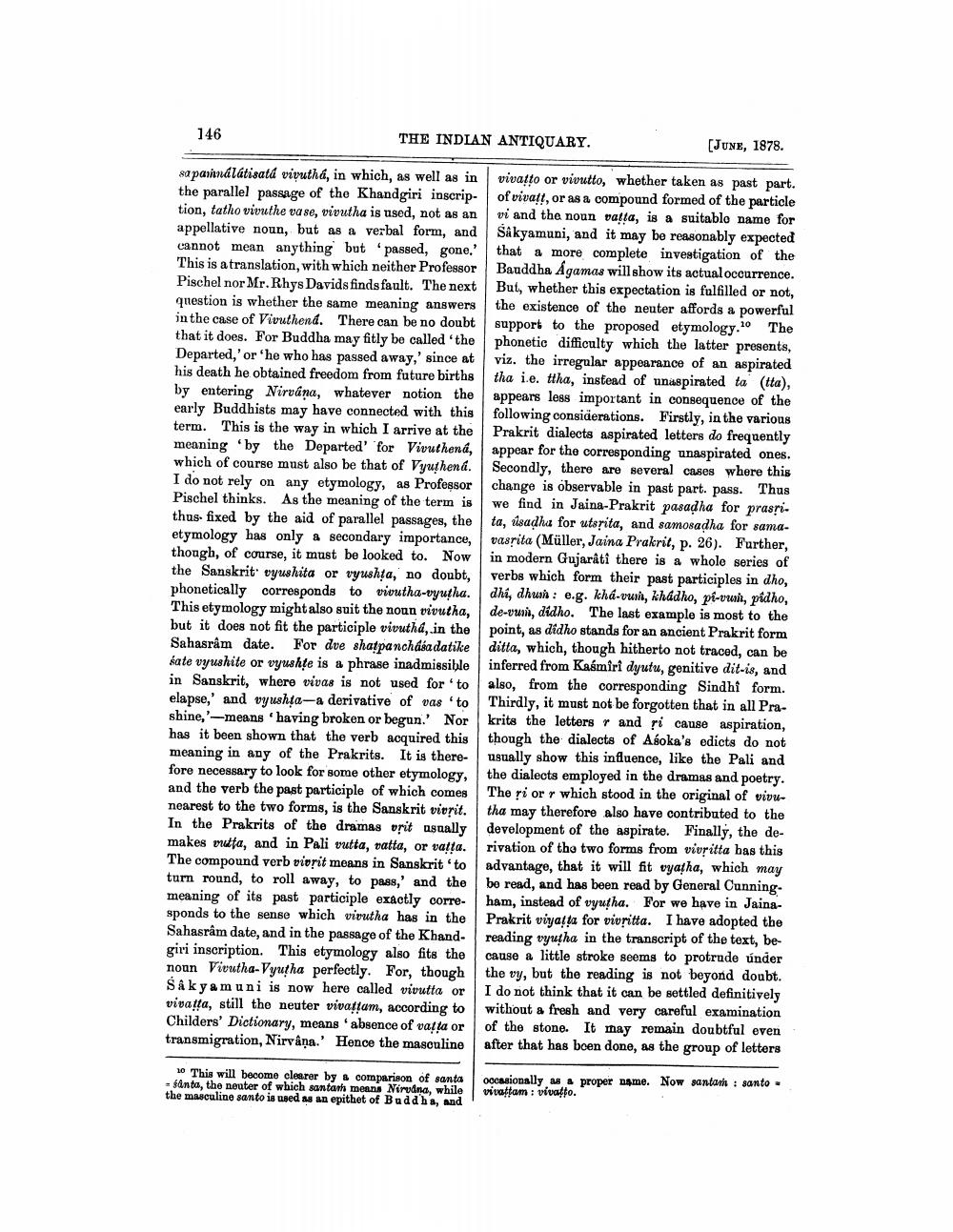________________
146
THE INDIAN ANTIQUARY.
(JUNE, 1878.
sa panndlátisatá vivutha, in which, as well as in vivatto or vivutto, whether taken as past part. the parallel passage of the Khandgiri inscrip- of vivatt, or as a compound formed of the particle tion, tatho vivuthe va se, vivutha is used, not as an vi and the noun vatta, is a suitablo name for appellative noun, but as a verbal form, and Sakyamuni, and it may be reasonably expected cannot mean anything but passed, gone.'|| that a more complete investigation of the This is a translation, with which neither Professor Bauddha Agamas will show its actual occurrence. Pischel nor Mr. Rhys Davids finds fault. The next But, whether this expectation is fulfilled or not, question is whether the same meaning answers the existence of the neuter affords a powerful in the case of Vivuthend. There can be no doubt support to the proposed etymology. The that it does. For Buddha may fitly be called "the | phonetic difficulty which the latter presents, Departed,' or 'he who has passed away,' since at viz. the irregular appearance of an aspirated his death he obtained freedom from future births tha i.e. ttha, instead of unuspirated ta (tta), by entering Nirvana, whatever notion the appears less important in consequence of the early Buddhists may have connected with this following considerations. Firstly, in the various term. This is the way in which I arrive at the Prakrit dialects aspirated letters do frequently meaning 'by the Departed' for Vivuthena, appear for the corresponding unaspirated ones. which of course must also be that of Vyuthena. Secondly, there are several cases where this I do not rely on any etymology, as Professor change is observable in past part. pass. Thus Pischel thinks. As the meaning of the term is we find in Jaina-Prakrit pasadha for prasmi. thus. fixed by the aid of parallel passages, the ta, risadhu for utsita, and samosadha for samaetymology has only a secondary importance, vassita (Müller, Jaina Prakrit, p. 26). Further, though, of course, it must be looked to. Now in modern Gujarati there is a whole series of the Sanskrit: vyushita or vyushta, no doubt, verbs which form their past participles in dho, phonetically corresponds to vioutha-vyutha. dhi, dhui : e.g. khá-vuin, khádho, pi-vuit, pidho, This etymology might also suit the noun vivutha, de-vun, didho. The last example is most to the but it does not fit the participle vivutha, in the point, as didho stands for an ancient Prakrit form Sahasrâm date. For dve shatpanchéadatike ditta, which, though hitherto not traced, can be šate vyushite or vyushțe is a phrase inadmissible inferred from Kasmiri dyutu, genitive dit-is, and in Sanskrit, where vivas is not used for to also, from the corresponding Sindhi form. elapse,' and vyushta-a derivative of vas 'to Thirdly, it must not be forgotten that in all Prashine,'-means 'having broken or begun.' Norkrits the letters and si cause aspiration, has it been shown that the verb acquired this though the dialects of Asoka's edicts do not meaning in any of the Prakrits. It is there usually show this influence, like the Pali and fore necessary to look for some other etymology, the dialects employed in the dramas and poetry. and the verb the past participle of which comes The ri or r which stood in the original of vivunearest to the two forms, is the Sanskrit virpit. tha may therefore also have contributed to the
In the Prakrits of the dramas writ asually development of the aspirate. Finally, the demakes vuta, and in Pali vutta, vatta, or vatta. rivation of the two forms from vivritta has this The compound verb vivsit means in Sanskrit 'to advantage, that it will fit vyatha, which may turn round, to roll away, to pass,' and the bo read, and has been read by General Cunningmeaning of its past participle exactly corre- ham, instead of vyutha. For we have in Jainasponds to the sense which vivutha has in the Prakrit viyatta for vivsitta. I have adopted the Sahasrâm date, and in the passage of the Khand- reading vyutha in the transcript of the text, begiri inscription. This etymology also fits the cause a little stroke seems to protrude únder noun Vivutha-Vyutha perfectly. For, though the vy, but the reading is not beyond doubt. Śå kyamuni is now here called vivutta or I do not think that it can be settled definitively vivatta, still the neuter vivattam, according to without a fresh and very careful examination Childers' Dictionary, means 'absence of valta or of the stone. It may remain doubtful even transmigration, Nirvana.' Hence the masculine after that has been done, as the group of letters
10 This will become clearer by & comparison of santa santa, the neuter of which santan means Nirvana, while the masculine santo is used as an epithet of Buddha, and
occasionally as a proper name. Now santan : santo vivattam: vivaffo.




